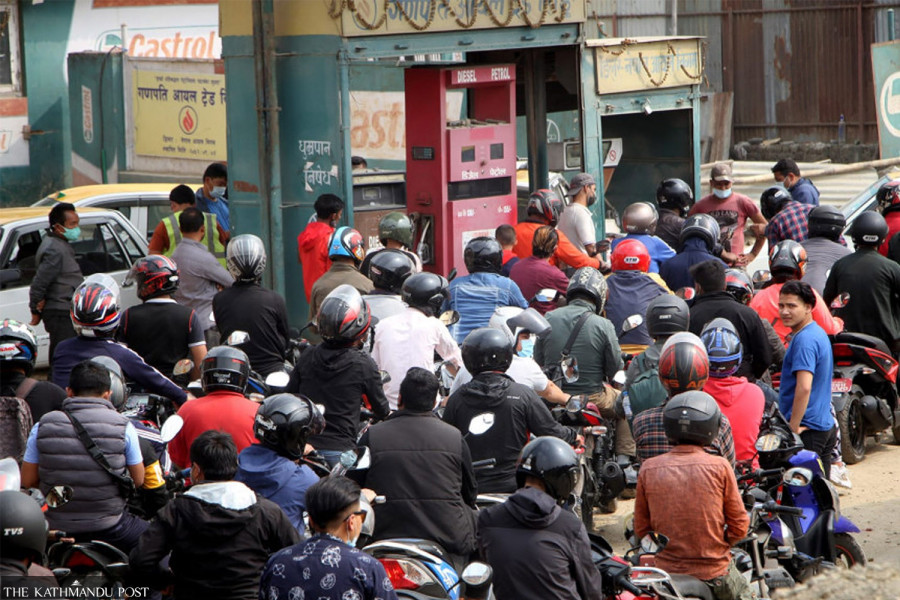National
Government unclear on how to adjust taxes days after it slashed fuel prices
Finance Ministry says Supply Ministry decided on price cuts; the former has made no move to revise the taxes yet.
Prithvi Man Shrestha
Even three days after the government decided to slash fuel prices, saying it was done by reducing taxes, there is no clarity on tax adjustment.
Minister for Industry, Commerce and Supplies Dilendra Prasad Badu on June 25 announced that the government decided to reduce the prices of petrol and diesel while reducing the equivalent amount of taxes levied on them.
The government move followed a public outcry that fuel prices had shot through the roof.
In line with the government’s decision, the Nepal Oil Corporation board slashed the price of petrol by Rs20 per litre and made diesel cheaper by Rs29 per litre.
The revision brought the prices of petrol down to Rs179 per litre, and diesel and kerosene to Rs163 per litre each.
Nepal Oil officials had told the Post that it was up to the Finance Ministry to revise the taxes. But two senior officials told the Post that the Finance Ministry has not yet taken any decision on the matter.
“No decision has been made on reducing taxes,” said Dhundi Prasad Niraula, spokesperson for the ministry. “As the decision to reduce fuel prices appears to be unrelated to taxes because the decision was made solely by the Supply Ministry, it is not related to the Finance Ministry,” he said.
Financial Act 2022 has already come into effect which is part of the budget for next fiscal year 2022-21. Both Houses of Parliament endorsed the budget for next fiscal year but the government has not yet proposed amending the Financial Act.
Another senior official at the Finance Ministry, who wished to remain anonymous, said that no decision has been taken on tax reduction.
“Discussions, however, did revolve around compensating the Nepal Oil Corporation for the reduction in the prices of petrol and diesel,” said the official. “But no decision has been taken yet.”
On Tuesday, Finance Ministry officials had held a discussion with NOC officials regarding compensating the oil monopoly as it is selling fuel at a lower price than it had fixed on June 19.
“We communicated to them that further discussions will be held with the NOC regarding it,” the official said.
A number of news websites, however, reported that the finance ministry is planning to reimburse the differential cost of price reduction to the NOC instead of slashing taxes.
A number of government officials the Post talked to, however, didn’t confirm if any decision was taken regarding reimbursement.
Binitmani Upadhyay, deputy director of the Nepal Oil Corporation, said his office has not yet received any letter regarding how the government would compensate the NOC for the reduced prices.
Given the lack of clarity regarding tax reduction, the state-owned oil monopoly has continued to pay the taxes as earlier.
“We are paying taxes amounting to Rs300 million to Rs350 million a day for all the petroleum products we import,” said Upadhyay, who is also the spokesperson at the NOC.
The government has been levying taxes on petroleum products under seven different headers. According to the NOC, the government was levying Rs65.61 in taxes on every litre of petrol sold at Rs199. It collected Rs49.53 in taxes on every litre of diesel sold at Rs192.
The government also collects Rs10 as infrastructure tax per litre of petrol and diesel sold. The government earned Rs118.82 billion in various taxes levied on fuel in the first 11 months of this fiscal year. The government drew much criticism from the public for the high taxes.
The NOC expects to pay a total of Rs125 billion in taxes in the current fiscal year.
With the government not deciding how it would compensate the NOC for its losses, the oil monopoly is expected to incur heavy losses.
When the prices of petroleum products were hiked on June 19, the corporation was facing a monthly loss of Rs4.7 billion, according to the NOC. “If we are not compensated for the reduced prices, our monthly losses will reach Rs9.67 billion,” said Upadhyay. “This means, we may not be able to pay the Indian supplier—the Indian Oil Corporation—and fuel supply may get affected.”
The NOC already owes the IOC around Rs22 billion in unpaid dues, according to Upadhyay.
For the NOC, the concern is not how the government would compensate for the loss arising from price reduction.
“The government must compensate us by either reducing taxes or any other ways,” said Upadhyay.




 21.12°C Kathmandu
21.12°C Kathmandu















